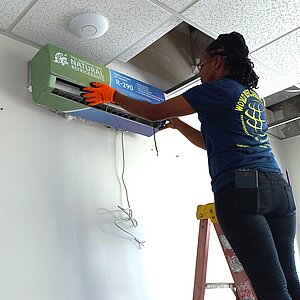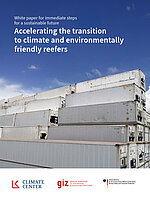Greener Reefers in international maritime transport
Reefer containers are vital for trading food and non-food products globally. At the same time, they are also an important source of emissions and contribute notably to the 140 million tonnes of CO2eq annual emissions released by the container shipping industry. This is due to the use of harmful refrigerants and the high energy consumption of conventional reefer containers. The sector is growing rapidly, increasing the negative climate impacts considerably in a business-as-usual scenario. To mitigate these impacts, refrigerant leakages and energy consumption need to be reduced and sustainable solutions with natural refrigerants and high energy efficiency levels need to be promoted. The project is training reefer technicians to reduce leakage rates and ensure optimized energy efficiency. It is alo piloting climate friendly and energy efficient reefer containers.
- Countries
- Costa Rica, South Africa
- IKI funding
- 2,900,000.00 €
- Duration
- 04/2023 till 10/2026
- Status
- open
- Implementing organisation
- Deutsche Gesellschaft für Internationale Zusammenarbeit (GIZ) GmbH
- Political Partner
-
- Department of Forestry, Fisheries and the Environment (DFFE) - South Africa
- Ministry of Environment and Energy (MINAE) - Costa Rica
- Implementing Partner
-
- National Institute of Learning - Costa Rica
State of implementation/results
- Kuehne Foundation (www.kuehne-stiftung.org/…) announced a collaboration with the Greener Reefers project at COP 28 in Dubai in December 2023. More information can be found here: www.green-cooling-initiative.org/…
- With guest speakers from one of Europe’s largest independent research organisations on refrigerants, the Norwegian “Stiftelsen for industriell og teknisk forskning” (SINTEF), and Kuehne Foundation, the project presented the concept of Greener Reefers and their low climate-impact at COP 28 in the Montreal Protocol Pavilion. Greener Reefers are highly energy efficient refrigerated maritime containers that use natural refrigerants and blowing agents with ultra-low climate impact (Global Warming Potential below 1).
- Carrier Transicold and the project have agreed to collaborate to advance cold chain development and training in Costa Rica and South Africa. The memorandum of understanding was signed at COP 28 and focuses on providing training to technicians for refrigerated containers using natural refrigerants, such as carbon dioxide.
- Thermo King and GIZ launch pioneering "Greener Reefer" using natural refrigerants. The project aims to develop a safe and efficient intermodal shipping container with a lower carbon footprint compared to conventional reefers. This will be achieved by improved thermal insulation of the container and optimized reefer machinery system design. It will also feature R290, a hydrocarbon refrigerant with Global Warming Potential of under 0.1 and an ozone depletion potential of 0.
- The first reefer training with natural refrigerants was launched on 14.07.2025 in South Africa at the training center ACRA. Further trainings will be offered by this institution and in cooperation with the training center West Coast College.
Latest Update:
12/2025
Further links
- Short report on greener reefers alliance
- Report: Carrier Transicold and GIZ Announce Agreement to Advance Cold Chain Development and Decarbonization in Costa Rica and South Africa at COP28
- Report: Green Reefer Alliance launched at UNFCCC COP28
- Report: Greener Reefers: Pioneering Sustainable Cold Chain Solutions - A Mitigation potential analysis
- Report: ATMO Europe: GIZ/Thermo King Collaborating on Proof of Concept for R290 Maritime Shipping Containers
Project relations
Legend:
The link has been copied to the clipboard





